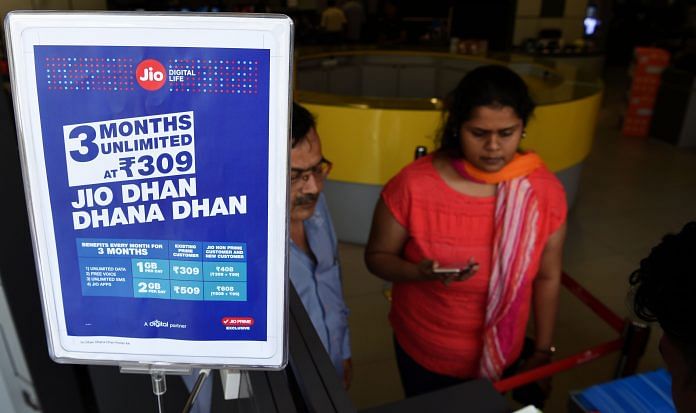There is no doubt that Mukesh Ambani’s entry into the telecom business has engineered a massive public benefit. But a healthy industry is essential.
About 15 years ago, my monthly mobile phone bill used to be Rs 5,000-6,000 and more. It dropped to Rs 2,000 some years back, and fell further last year to about Rs 1,000. Now it is in the hundreds. As technology has moved up from one “G” (for generation) to the next, and as new entrants have undercut established players, the biggest beneficiaries have been customers, whose ranks have grown manifold.
At a tariff that is little more than the price of a modestly-priced restaurant meal, they now get unlimited calls, free long-distance roaming, massive numbers of text messages, and gigabytes of data downloads — plus freebies like video-streaming services from Amazon Prime. Those old enough to remember the time when a call cost Rs 16 per minute — people were timing their calls after 9 pm, when the tariff dropped — will look back in wonder.
The man pressing the trigger for the price cuts has been without question Mukesh Ambani, who unusually has entered the business not once, but twice. On each occasion, he brought telecom charges crashing to levels previously thought unimaginable.
The first time, he made mobile telephony truly affordable for the average person; now, he has engineered a data revolution. The figures vary, depending on whom you ask; but it would seem that data usage per customer in the last year has multiplied between five-fold and 25-fold. And yet the tariffs keep dropping.
As different telecom players look to the future, they see the possibility of completely free services for both voice and data, with business revenue and survival depending almost entirely on value-added services. This is a second, or perhaps third, telecom revolution taking place.
When an Ambani is involved, you should expect that all this comes bundled with loads of controversy. There was a massive row the first time, over what rivals said was a backdoor entry into the business. There have been other famous rows since, over the allocation of radio spectrum and issue of licences.
In the latest round, the controversies have been over a “launch that isn’t a launch” that Mukesh engineered through a hole in the rules, and now his big victory on the charges for connecting from one company’s network to another’s. This latest change of rules has meant that Mukesh’s Jio service has earned a profit in the latest quarter, while rivals have nosedived into red ink.
Questions remain, like whether Mukesh used financial strength from his other businesses to launch telecom price wars, which would not otherwise have been feasible—and whether this constitutes uncompetitive practice. But looking beyond the always-debatable questions of fair practice and fair rule-setting, there is no doubt that Mukesh’s entry into the telecom business has engineered a massive public benefit. If anyone other than the competitors who are hurting today were to weigh the pros and cons of what has happened, the likely answer is that the benefit outweighs the negatives.
Should one ignore the competitors’ plight? No, because customers won’t be served well if all but one service provider is incurring losses, and therefore unable to commit further investment. Already, the experience of poor service quality is a near-universal complaint — call drops, poor download speeds, and inadequate geographical coverage. These have always been there, of course. But proper customer service can be provided only by a healthy industry, and that requires more than one healthy service provider. At some point, therefore, attention has to turn to regulatory issues, or the customer will no longer be celebrating.
Still, you have to hand it to Mukesh for sheer daring. Who else in India would have sunk a stupendous $30 billion in a business that was yet to get a single customer? With that, the older of the Ambani siblings has shown that he is in a class of his own. Meanwhile, a competitor claims the rest of the industry has lost $50 billion. We should say “Jio Mukesh”, and hope that his competitors too will “Jio”!
TN Ninan is Chairman, Business Standard Pvt Ltd.
By special arrangement with Business Standard




It does not work like the government losses are from less taxes from telcos as they are not making much money some even losing money since telecom industry does not make significant money anyways the benefits far outweigh the loss the flagship digital India program could not have gotten a bigger boost I for one am thankful though prices will probably triple or at least double in a few years and then stay stable.
All that is very good. but what about the debt that the Ambani’s owe the govt? In our rush for freebies and cheap calls, we very conveniently overlook that our habits are putting a burden on the govt.